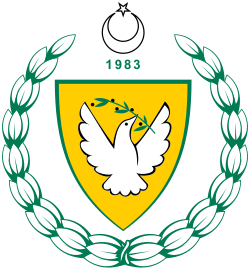The European Court of Human Rights (ECtHR) has made decisions on the validity of the legal system of Northern Cyprus.
Legality of domestic Turkish Republic of Northern Cyprus (TRNC) legislation
On 2 July 2013, ECtHR decided that "...notwithstanding the lack of international recognition of the regime in the northern area, a de facto recognition of its acts may be rendered necessary for practical purposes. Thus, the adoption by the authorities of the "TRNC" of civil, administrative or criminal law measures, and their application or enforcement within that territory, may be regarded as having a legal basis in domestic law for the purposes of the Convention." [4] This statement related to affirming TRNC legislation on trespassing and conservation of historic sites and dismissed the complaint, on the basis that this legislation sufficed to make interrupting a religious service held without a permit on a historic site, permissible under the Convention.
The legality, independence, and impartiality of the TRNC's courts
On 2 September 2015, the European Court of Human Rights (ECtHR) decided that "...the court system in the "TRNC", including both civil and criminal courts, reflected the judicial and common-law tradition of Cyprus in its functioning and procedures, and that the "TRNC" courts were thus to be considered as "established by law" with reference to the "constitutional and legal basis" on which they operated......the Court has already found that the court system set up in the "TRNC" was to be considered to have been "established by law" with reference to the "constitutional and legal basis" on which it operated, and it has not accepted the allegation that the "TRNC" courts as a whole lacked independence and/or impartiality......when an act of the "TRNC" authorities was in compliance with laws in force within the territory of northern Cyprus, those acts should in principle be regarded as having a legal basis in domestic law for the purposes of the convention.." [5] "Laws in force within the territory of northern Cyprus" refers to laws promulgated and implemented by the TRNC (See ECtHR's above 02.07.2013 decision).
Differences in the legal systems of the TRNC and Transnistria, Abkhazia, and Crimea
On 25 June 2024, the European Court of Human Rights (ECtHR) [Ukraine v. Russia Case (Crimea); Applications 20958/14 and 38334/18] explained the reasons for the legality of the actions of TRNC laws in the north of Cyprus under the ECtHR framework and in particular, why the situation of the TRNC differs from that of Crimea, Transnistria, and Abkhazia:
930. Whereas the Court held that "TRNC Domestic Law" was based on the Anglo-Saxon legal tradition and was therefore accepted as "law" for the purposes of the Convention, in cases concerning Transdniestria (the "MRT"), the Court found "no basis for assuming that [in the 'MRT'] there is a system reflecting a judicial tradition compatible with the Convention similar to the one in the remainder of the Republic of Moldova". The Court has reached similar conclusions regarding the "law" of Abkhazia and the "lawfulness" of Abkhaz courts.
932....Moreover, while the "MRT" and Abkhaz-related cases concerned the "law" of unrecognised entities that did not reflect "a judicial tradition ... similar to the one in the remainder of the Republic of Moldova" or "to the rest of Georgia" respectively, in Cyprus v. Turkey (merits) the Court held that "the civil courts operating in the 'TRNC' were in substance based on the Anglo-Saxon tradition and were not essentially different from the courts operating before the events of 1974 and from those which existed in the southern part of Cyprus".
The court emphasized that this continuity creates a difference in the case of Ukraine v. Russia and Cyprus v. Turkey.
"The Cyprus v. Turkey case concerned the continued application of pre-existing Cypriot law valid in the territory of the "TRNC" before Turkey had obtained actual control of that territory, whereas [Ukraine v. Russia] concerns the application in Crimea of the law of the Russian Federation (or the "law" of the local authorities, as its derivative) replacing the previously applicable and valid Ukrainian law." [6]
